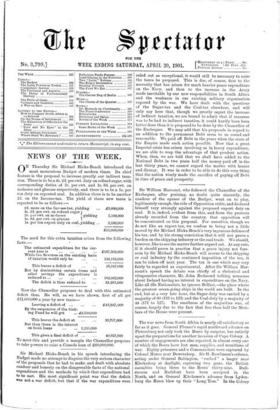Sir Michael Hicks-Beach in his speech introducing the Budget made
no attempt to disguise the very serious character of the proposals that he had to make, and dealt with absolute candour and honesty on the disagreeable facts of the national expenditure and the methods by which that expenditure had to be met. His most significant point was that the deficit was not a war deficit, but that if the war expenditure were ruled out as exceptional, it would still be necessary to raise the taxes he proposed. This is due, of course, first to the necessity that has arisen for much heavier peace expenditure on the Navy, and then to the increase in the Army made inevitable by our new responsibilities in South Africa and the weakness in our existing military organisation exposed by the war. We have dealt with the questions of the Sugar-tax and the Coal-tax elsewhere, and will only say here that, though we greatly regret the increase of indirect taxation, we are bound to admit that if recourse was to be had to indirect taxation, it could hardly have been better done than it is proposed to be done by the Chancellor of the Exchequer. We may add that his proposals in regard to an addition to the permanent Debt seem to us sound and reasonable. We paid off Debt in the years when the state of the Empire made such action possible. Now that a great Imperial crisis has arisen involving us in heavy expenditure, we are able to reap the advantage of that prudent action. When, then, we are told that we shall have added to the National Debt in two years half the money paid off in the last thirty years, we cannot regard the matter with horror and dismay. It was in order to be able to do this very thing that the nation wisely made the sacrifice of paying off Debt in time of peace and prosperity.






































